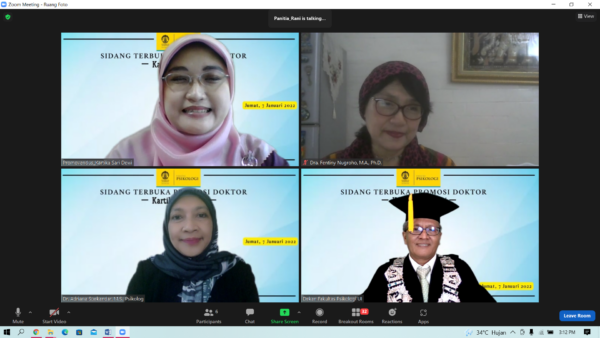Depok, 26 Januari 2022. Persepsi mengenai wanita yang ditinggal cerai dan keluarganya di dalam budaya patriarki cenderung negatif. Kesulitan finansial yang dialami, tekanan dari lingkungan sosial, dan dianggap kurang mampu mengasuh anak, adalah masalah yang mereka hadapi. Stigma ini memunculkan gambaran broken home family yang dianggap tidak dapat memberikan kesempatan bagi anggota keluarganya untuk berkembang. Ketidakberfungsian keluarga sering kali dikaitkan dengan permasalahan psikologis anak, seperti kenakalan remaja dan gangguan kesehatan mental anak.
Stigmatisasi negatif ini menjadi latar belakang disertasi berjudul “Dinamika Kualitas Interaksi Keluarga, Dukungan Sosial, dan Kesejahteraan Keluarga Ibu Tunggal Pascaperceraian” yang ditulis oleh Kartika Sari Dewi. Disertasi ini berhasil dipertahankan pada sidang promosi doktor Program Pascasarjana Fakultas Psikologi Universitas Indonesia pada 7 Januari 2022.
Dalam disertasinya, Dewi menyebutkan, “Ada beberapa ibu yang mengungkap stigmatisasi lingkungan terhadap janda cerai. Ia dan anaknya sering kali dipandang sebagai broken home family. Hal ini memengaruhi upaya mereka mencapai kesejahteraan keluarga karena lingkungan memandang perceraian sebagai peristiwa negatif.”
Penelitian dengan pendekatan kualitatif ini mengungkap gambaran kesejahteraan keluarga pada keluarga ibu tunggal pascaperceraian dan faktor-faktor internal yang mendukung ibu-anak dalam menghadapi tantangan pascaperceraian. Selanjutnya, dengan teknik analisis: categorical aggregation, pattern matching, dan explanation building, studi ini berfokus pada dinamika interaksi keluarga, dukungan sosial, dan peran ayah pascaperceraian dalam menghadapi tantangan keluarga berstruktur tidak utuh untuk meraih kesejahteraan keluarga. Partisipan penelitian ini adalah sepuluh ibu (30–48 tahun) dan empat anak (18–30 tahun).
Berbeda dari pemahaman yang berkembang, hasil studi ini mengungkapkan bahwa ketidakberfungsian keluarga pascaperceraian bukan merupakan dampak dari perubahan struktur keluarga, melainkan dampak interaksi interpersonal yang tidak sehat. Ada tidaknya perubahan struktur, keluarga tetap dapat mengalami disfungsi ketika antaranggota tidak memiliki interaksi yang berkualitas. Sebaliknya, meskipun perubahan struktur terjadi, dengan adanya proses penyesuaian, keluarga bercerai tetap memiliki kesempatan untuk dapat berfungsi optimal dan sejahtera.
Kesejahteraan keluarga pada ibu tunggal pascaperceraian dipahami sebagai kebersamaan ibu-anak dalam interaksi yang hangat dan terpenuhinya kebutuhan keluarga. Tidak hanya itu, kebaharuan studi ini melengkapi celah dalam FST dengan menjelaskan peran interaksi keluarga dalam mencapai kesejahteraan keluarga. Keluarga bercerai dapat mencapai kesejahteraannya ketika memiliki kondisi penyangga protektif berupa kemandirian finansial ibu, keterbukaan dalam interaksi dan relasi positif ayah-anak, proaktif dalam mencari dukungan sosial, serta spiritualitas positif pada ibu.
Konsep maternal gatekeeping memegang peran kunci dalam kualitas interaksi keluarga pascaperceraian. Peran ayah pascaperceraian dalam menyediakan relasi positif bersama anak tetap dibutuhkan. Meskipun demikian, perceraian tetap membawa dampak psikologis pada anak terkait dengan makna keluarga,
skema gender, perbedaan persepsi terhadap dukungan keluarga besar, dan timbulnya adverse childhood experiences (ACE).
Promosi doktor ini dipimpin oleh Dr. Bagus Takwin, M.Hum., sebagai Ketua Sidang, dengan Dr. Adriana Soekandar Ginanjar, M.S., Psikolog., sebagai Promotor, dan Dra. Fentiny Nugroho, M.A., Ph.D., sebagai Kopromotor. Sementara itu, Tim Penguji diketuai oleh Prof. Dr. Guritnaningsih dengan anggota terdiri atas Prof. Dr. Juke Roosjati Siregar, M.Pd., Psikolog, Prof. Dr. Faturochman, M.A., Prof. Dr. Elizabeth Kristi Poerwandari, M.Hum., Psikolog, dan Dr. Fivi Nurwiyanti, M.Si., Psikolog.
Sumber: SIARAN PERS UI
Depok, 26 Januari 2022

